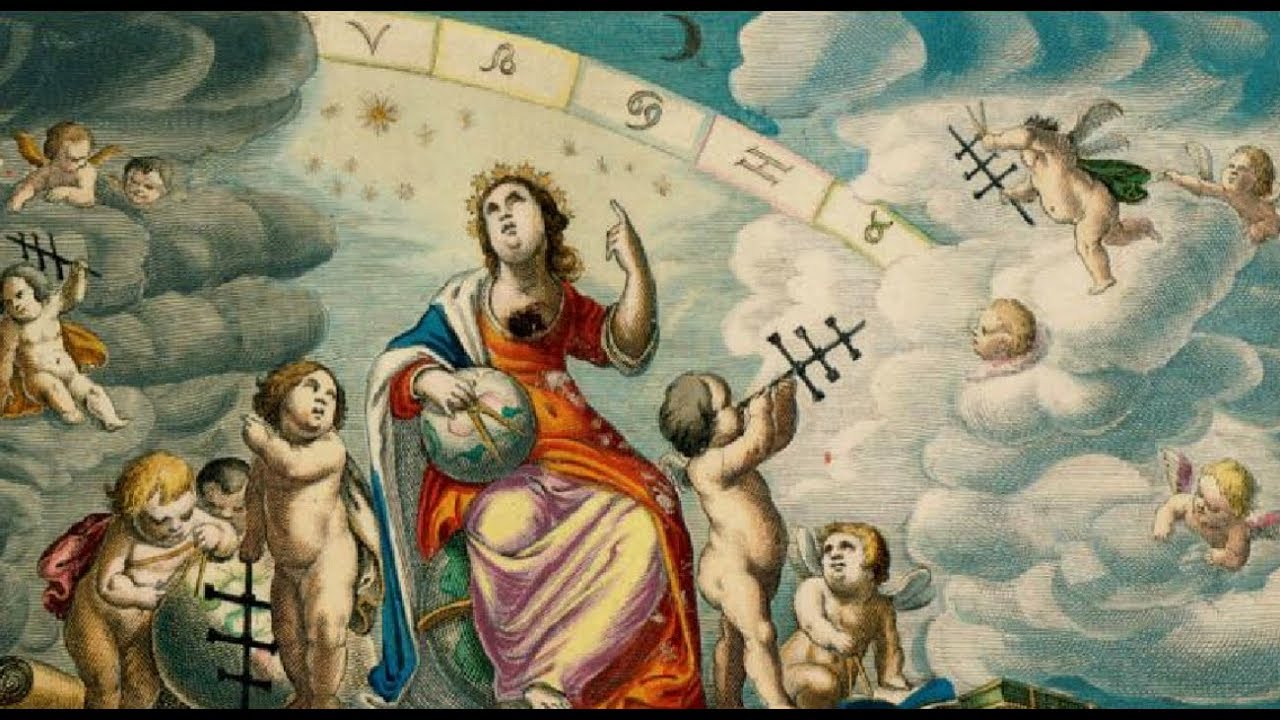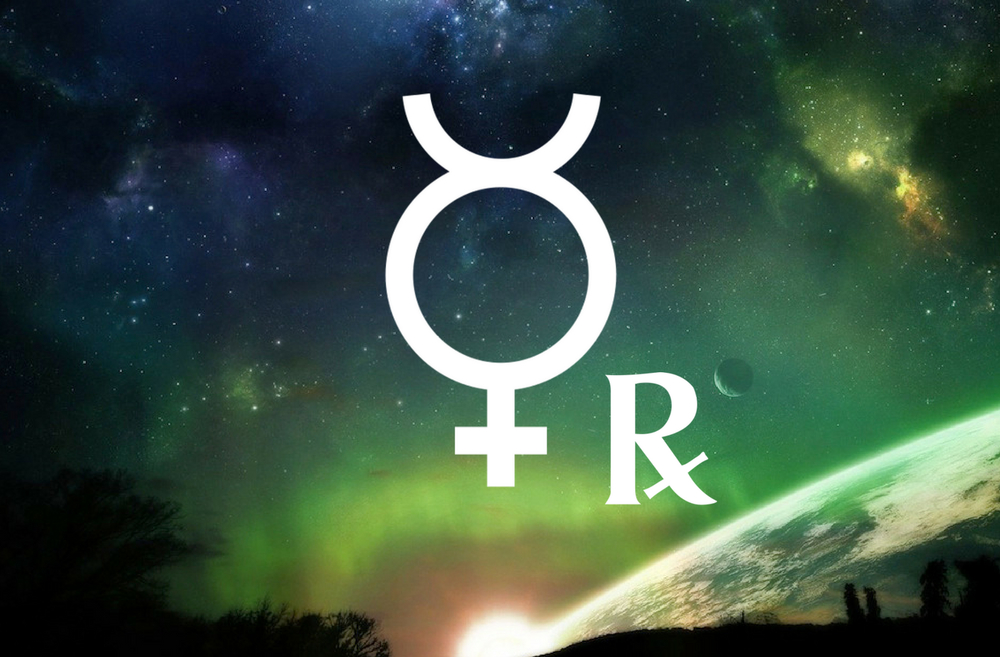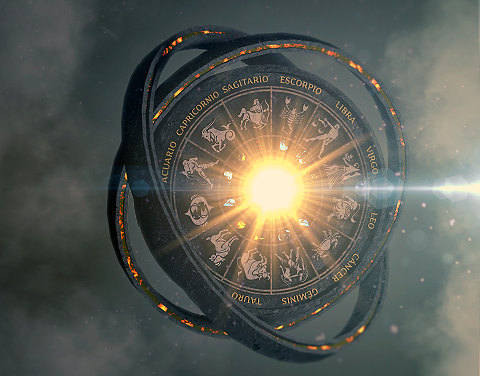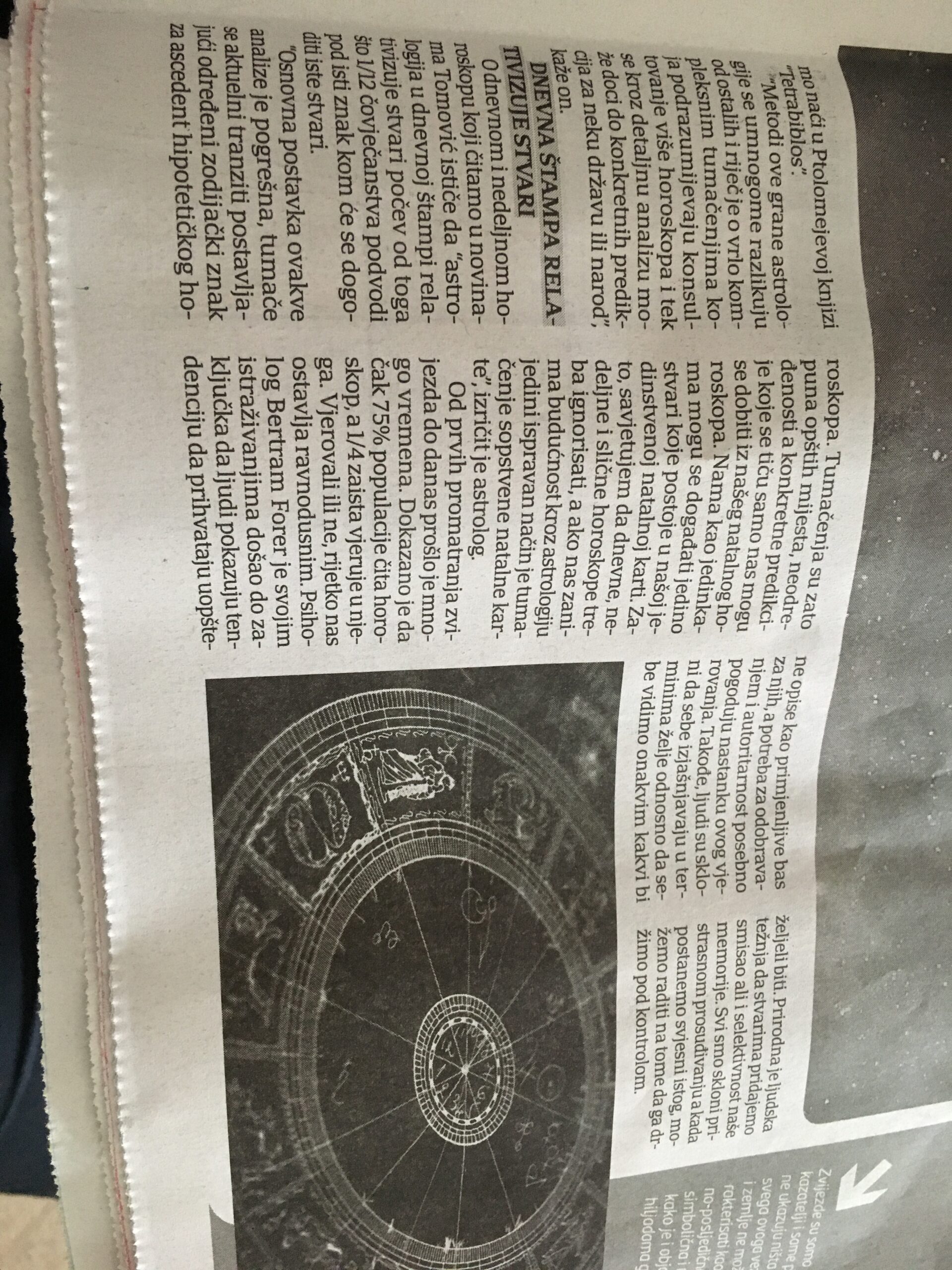By definition, Arabic lots represent astrological factors found by mathematical calculations that include three other factors in the horoscope such as planets or angles. The distance between the two factors is added to the third (usually the ascendant), thus obtaining the position of a certain Arabic lot. It is one of the most important astrological concepts, although the most mysterious. The lots are thought to be more closely related to the spiritual part of human existence, so they are ascribed deeper meanings in the interpretation of the natal chart topics. In Hellenistic astrology, they were primarily used to give additional meanings to signs and houses in the interpretation of certain topics in the chart, e.g. if the lot of marriage falls into the second house and Scorpio, that house and its ruler add some significations concerning marriage, although these places would not be observed in connection with the said subject in some ordinary procedure. Furthermore, in practical terms, lots could also be regarded as that third point that astrologers would interpret in the context of a particular natal chart topic, such as offspring, marriage, career, etc. The first step would be to analyze a suitable planet, such as Venus concerning marriage. Then the respective house and its ruler would be considered, in this case, that would be the seventh house, and finally, the third step would be to analyze the appropriate lot, in this example, the lot of marriage. This is also implicit in the “threefold rule”, that is, if something is indicated in one area of life through only one of these three factors, then the outcome is possible, if two factors point to the same, then the outcome is probable, and if confirmed through all three, then the outcome is certain. By far the most famous is the lot of Fortune, also known as the lot of fate, but there are innumerable lots and it can be said that they flourished in medieval astrological practice. But the topic of this two-part study are seven hermetic lots, with special reference to the four lots that Hellenistic astrologer Vettius Valens pointed out as the most important, namely the aforementioned Fortuna, Spirit, Eros (Love), and Necessity, and these are dealt in detail in the part two.
Arabic lots originate from the Babylonian astrological concept of the relationship between the Sun and Moon through the arc of the longitudinal distance between them projected from the point of the horizon (Ascendant). Although some claim that their origins are Egyptian, it seems that, like everything in astrology, two basic astrological factors have been derived and conceived from this original order. In contrast to their commonly known name, Arabic lots have been developed methodologically for the most part in Hellenistic astrology. The Arabs added a large number of new ones to this method while retaining Greek heritage. Arabic lots serve for deeper natal analysis and to uncover the intrinsic meaning of the horoscope. The seven basic Arabic lots are the points of the soul, or those pillars of the soul, derived by analogy from the seven planets of the horoscope. These seven planets are related to Pythagoras’ numerical week and even earlier before him, with dualistic ancient Persian Mithraism, that is, Persian mysteries of the sevenfold initiation of worship, as well as the seven steps of the fall of the soul, which, on the way to the earthly embodiment, passes through 7 planetary spheres and to ascend through them back to one of the four celestial gates after death: Aldebaran – east, Regulus – north, Antares – west and Fomalhaut – south, which are therefore referred to as the royal stars and guardians of the heavenly gates. Plato’s interpretation of the fall (descent) of the soul seems to be inspired by the Persian mysteries. Plato speaks of the eighth sphere, the sphere of the stars, that is, the zodiac, which is considered to be the place where souls originate from and from which everyone, individually, on its journey to Earth, passes through seven planetary spheres in the Chaldean order from Saturn to the Moon. On this journey, the soul is enriched by each sphere, endowed (blessed) with the pure planetary essence of each planetary principle, which is more or less corrupted by earthly incarnation. After the death, the soul ascends in the reverse order of the journey (from the Moon to Saturn) to purify itself from earthly flaws through each sphere individually according to the type of flaw (about them later). The more it rises through the spheres and the cosmic purification, the soul becomes easier and purer to enter the eighth sphere of bliss perfected. Aristotle adopted this theory from his teacher. St. Thomas Aquinas, a worshiper of Aristotle, was familiar with this theory of the connection between soul and planet. There is speculation that this theory is closely related to the seven virtues and the seven deadly sins of Christian theology. The first three virtues: hope, faith, and mercy are known as theological virtues, while the other four (wisdom, steadfastness, temperance, and righteousness) are called natural virtues. These virtues are thus related to the planetary virtues and vices so that we have:
| Planet | Virtue | Sin |
| Moon | Hope | Gluttony |
| Sun | Faith | Pride |
| Mercury | Wisdom | Envy |
| Venus | Mercy | Lust |
| Mars | Courage | Rage |
| Jupiter | Temperance | Greed |
| Saturn | Justice | Laziness |
Virtues and sins are thus brought into correlation with the lots of the soul. This is especially notable if we observe that each planet has its “own” lot. Specifically, in Chapter 23 of his „Introduction to Astrology“, Paulus of Alexandria presented a method of calculating seven lots that are related to traditional planets, while citing the work known as “Panaretus”, whose authorship is associated with Hermes Trismegistos. These are called “hermetic lots”. In the picture below you can also see the method of calculating these points (all distances are projected from the ascendant):
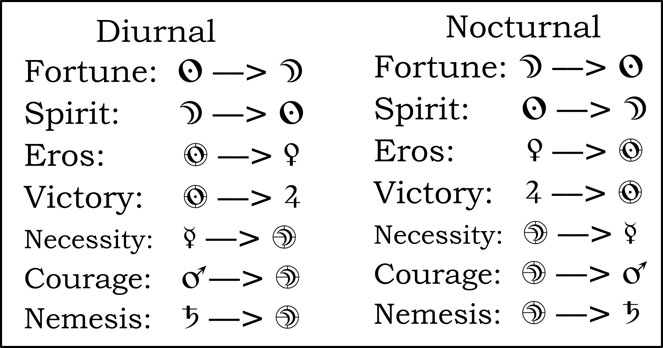
The first thing that we can see here is that only the lots of Fortune and Spirit are calculated based on the distance between the luminaries (Sun and Moon), while in other cases, the lots are calculated from the distance between the corresponding planet and either the lot of Fortune or the lot of Spirit or vice versa. When it comes to this calculation, and in connection with the foregoing, we can observe certain important hermetic principles that are coming to light here. First, the ratio in these calculations seems to take into account the ruling luminary, or luminary of the sect. Thus we see that the calculation for the lot of Fortune always starts from the ruling luminary to the other, that is, in day births (where the Sun is the ruling luminary), this lot is calculated by measuring the distance from the Sun to the Moon, that is, the starting point is the Sun, whereas at night births it is the Moon, as the ruling luminary. Such a measurement seems to imply the idea of moving from light to darkness since the calculation literally moves from a dominant luminary at certain times of day or night to the luminary that is somehow obscured at the time observed. This can be related to a deeper hermetic conceptualization that darkness is associated with matter and physical incarnation. In contrast, we see that the math for the lot of Spirit is opposite, that is, it always starts with the luminary that is opposite to the ruling sect, or to the luminary that is dominant at a given time – i.e. from the Moon to the Sun in day births. This also implies a hermetic relation of light with spirit and intellect.
Some other patterns can be observed concerning other lots. As it can be seen in the diagram above, lots associated with positive significations, such as the lot of Eros and the lot of Victory (Jupiter), are both calculated from the lot of the Spirit. The others, which have negative implications, are calculated from a lot of Fortune. It is obvious, then, that the lots of the benefic planets are related to the concept of spirit and light, and therefore to the lot of the Spirit, while the lots of malefic are linked to the concept of darkness and matter, and hence to the lot of Fortune. It seems possible that these assignments were made simply due to the apparent brightness of each of the planets involved, with Venus and Jupiter being the two brightest visible planets, and Mars and Saturn being the darker visible planets.
It is also interesting to note that some lots are calculated from the lot (Spirit or Fortune) to the planet, and some from the planet to the lot, both in the day or night nativities. The possible rationale behind this may again have something to do with the dominant luminary. Namely, the lot of Spirit is also called the lot of the Sun, and the lot of Fortune is considered as the lot of the Moon. As we can see, during the day, the lots of Venus and Jupiter are calculated from the lot of Spirit towards Venus and Jupiter, respectively, or vice versa at night. The concept behind this comes from the principle that the Sun is the one that emits light by day, so his lot assumes the same principle, while at night it behaves more closely to the nature of the Moon, that is, it receives light. In other words, this calculation is based on which of the two luminaries is more dominant in the calculation for lot of Spirit. Therefore, in day births the calculation moves from the lot of the Spirit towards the corresponding planet, imitating the principle of emitting light similar to the Sun, while in night births this calculation will go from the planet to the lot, which now plays the role of “recipient” since the Moon is a dominant luminary. This applies only to these two points since it’s only them that include the lot of the Spirit. However, the same principle seems to apply to the lots that include the Lot of Fortune. As in the daytime, the Moon is the dominant luminary in calculating the Lot of Fortune, and just like the lot of the Moon is opposite to the dominant luminary, the Sun, it acts as the recipient of the light, so the calculation starts from the planet towards Fortune. At night, when the Moon is the ruling luminary and the Sun is the dominant planet in the calculation of the Lot of Fortune, Fortuna is the one that “emits” light, so the calculation goes from it to the corresponding planet. We will return to these observations when we talk about the lots of Eros and Necessity mentioned by Valens, which are calculated differently than described here.
Since the lots calculation methods are given in the diagram above, in the rest of the text we will focus on the description of enumerated hermetic lots according to Paulus of Alexandria:
Paulus connects the lot of Fortune with the Moon and points out that it signifies the body, the things that native does to acquire possessions, reputation, and privileges.
As stated, the lot of the Spirit is connected with the Sun, hence it signifies the soul, intelligence, the exercise of all power (dunasteia), and is sometimes relevant in determining the career of the native or his profession (praxis).
The lot of Eros is associated with Venus and signifies desire and appetites as well as friendships and services.
The lot of Necessity associated with Mercury signifies restrictions, oppression, fighting, wars, hostilities, hatred, condemnation, and other limiting circumstances.
The lot of Courage is associated with Mars, thus denoting boldness, betrayal, strength (or raw power) and all evil deeds.
The lot of Victory is associated with Jupiter, thus signifying faith, good hope, competition, all kinds of benevolence, enterprise, and success.
The Lot of Nemesis is related to Saturn, so it refers to the ghosts of the underworld, things that are hidden, weakness, sadness, and the quality of death.
Izvori korišćeni u tekstu:
- Chris Brennan – Hellenistic Astrology: The study of Fate and Fortune
- Chris Brennan – The Theoretical Rationale Underlying the Seven Hermetic Lots
- Robert Zoller – Arabic parts in Medieval Astrology (a lesson from DMA course)
- Nataša Karalić Koprivica – traditional astrology blog link
